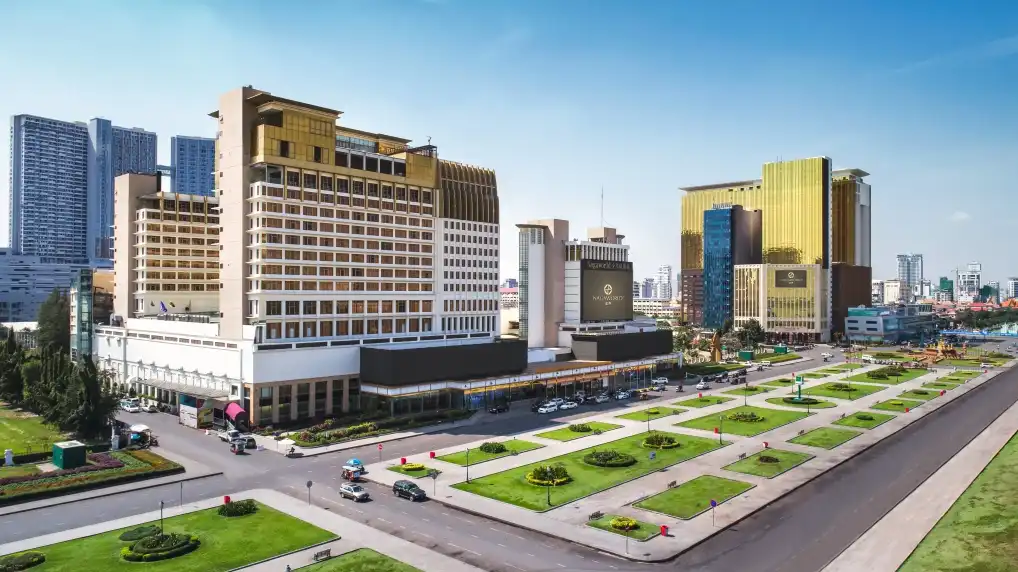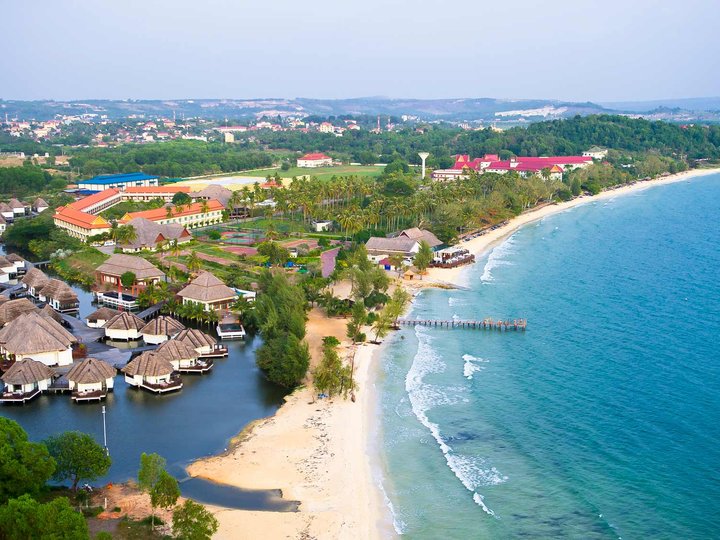Cambodia’s gaming story is not over by a long shot, with gaming expert Daniel Li pointing out how the country is trying to improve its oversight and legislation, rather than eviscerate the industry. Even as it attempts to grow, however, the threat of Thailand is now a concern, luring away both talent and punters, even threatening the success story of NagaWorld. But strides are being made and both authorities and companies are wary of the challenges ahead.
We’re joined today by Daniel Li, a gaming expert from Cambodia. Thank you for being with us.
Thank you, Kelsey. Pleasure to be here.
Now, there’s a lot of interesting things happening within Cambodia. I know that even (PAGCOR) Chairman (Alejandro) Tengco had mentioned Cambodia as being one of the potential not competitors but new elements within the gaming sphere. What would you say is the current size of the gaming market in the country?
So, Cambodia has a change in policy. So, I’ll start with explaining the policy first. So, in the past, the policy was to grant licenses to basically protect the borders from our neighbors encroaching into the land. So, we were quite loose in terms of the criteria for approving licenses – this is going back to the early, early 2000s. Now, of course, Phnom Penh is dominated by an exclusive license – NagaWorld. And with that, we have at present about 87 licenses, full licenses, there are some that are temporary that we’re not putting in.
But, since then the government’s policy has shifted, with the introduction of the commercial gaming law (LMCG), the law and management of gambling – commercial gambling, in 2020, and then the formation of the Commercial Gambling Measurement Commission (CGMC). Now, the whole purpose of that is to be up to date with international regulations, and to be compliant in terms of FATF, for example, anti-money laundering, and also in terms of reducing risk of responsible gaming, in that sense.
So, one of the things that the government has actively done right now is to relook at what we have in terms of a sector and to transition it into an industry – which is one of the big focuses that the CGMC is looking at. Now, the CGMC, unlike PAGCOR, we also focus on lotteries. So basically, any gambling in the country would fall under the CGMC, which is covered by the law. And that also includes sports betting – in terms of animal betting, should that ever happen, but any form of gambling would be under our jurisdiction.
But is it actually growing? Do you see that that the industry itself is trying to grow? They did manage to shift off of the FATF greylist. So is that attracting more investment? And does that mean that there’s higher potential?
Of course, Naga has the best story to date – having exclusion and being about 200 kilometers from Phnom Penh. But in terms of us getting off the FATF grey list – we were put on the list in 2019, at the height of basically a boom in terms of gambling in Cambodia. Naga, at that time, reported $1.7 billion GGR and the year before about $1.3 (billion). So, that obviously raised a lot of questions in terms of the movement of funds and we were put on a grey list.

However, we’ve been able to comply with FATF, and we’ve made giant steps in terms of regulating certain industries, like banking and finance; in casinos, reducing the numbers and putting in high due diligence in terms of people applying for licenses. And with that we were successful to get off the list, and we came off the list in February 2023.
So, in terms of investment, obviously what the government is looking at, not just from the gambling industry, but we’re looking at across all industries. We’re looking for legitimate business operators, investors, and at the start of this year, we have very good numbers in terms of investment. Again, Prime Minister Hun Sen stepped down last year and his son, Prime Minister Hun Manet, has taken over. And his leadership has been very progressive, forward thinking, and they have actually made huge strides in resetting many industries, not just the gambling industry.
Now, there was a question about Hun Manet, he had made a comment recently about trying to control the gaming industry and then essentially shutter most of it. What was the misconception that happened there?
So the Prime Minister was over in Australia, and there was a press conference, but let me lead you up to that point. So, prior to that, about a month and a half before that, there had been serious violations of the law. So in Cambodia, Cambodians are permitted to gamble on lotteries or game of chance, they are not permitted to gamble in a casino environment. So, this was a loophole that, I guess, there were some illegal operators, or some unregistered games, that match to filter into the system, and was prominent in the borders and also in the provinces.
So, this caused a lot of Cambodians to be addicted to gambling, and it actually caused a lot of social concerns in those regions. And this was something that Hun Manet took upon himself to oversee personally, in terms of the reduction and total, I wouldn’t say cancellation of license, but the enforcement against all these illegal activities.
Now CGMC has been very, very much involved in all this. The government’s mandate to CMGC is to basically filter, remove, and educate. So, a lot of education has gone in. We’ve been working, the CGMC has been working, together with the provincial governors and enforcement agencies like the police and the military police, as well as basically creating a lot of seminars for the citizens in those areas.
So, there has been some misconception that I’ve heard that some people said “Oh, did he mean all forms of gambling?” The answer to that is that I don’t believe so. I believe that the casino, land-based casinos, do create a lot of work opportunities for citizens. And it is a contributor in terms of obviously, the GGR, and also with regards to the original policy of protecting the borders. So, it’s these errant lottery providers that have caused a major problem with Cambodians gambling.
I know that you do consult a bit with the government. When you’re advising them, what are the primary factors that you’re trying to convey to them?
So, the direction that every ministry has is to basically update and to come up with solid plans for the ministry or commissions to move forward. So, it wasn’t surprising that the CMGC engaged an external consultant to come in to work with them in terms of structuring, basically, policies; in terms of a training as well, not just policies, but training of the team. Now, a lot of team members in all new ministries and commissions are fairly young and eager. And it hasn’t been a situation where it’s because of nepotism, but it’s actually now based a lot on the person’s ability. So that’s also a big step forward for the government.
So, my primary role there is to provide advice, provide updates in terms of what’s going on in the region – how we can prepare for it, how can we move the industry forward and basically more of overseeing policies that they may have already written or they have and just to ensure that they are up to date and relevant to the industry as well.
We saw a lot of changes which happened over the years, in particular the growth and then decline of Sihanoukville – based upon a lot of Chinese-linked companies and online gaming. Do you have any expectations that there’s going to be a policy change in regards to online gaming?
Sihanoukville exploded, it didn’t boom, it exploded from 2016 onwards to 2019. And that was because of an influx of online operators. Now, a lot of online operators came in with a casino license, which is why at one stage we had a lot of casino licenses, because there is a provision in the casino licensing that you can operate an online casino. So, it’s not really an online license as an independent but it’s attached to the casino license.

And of course, we knew what happened after that – Prime Minister Hun Sen at a time, in I believe was August 2019, made a decision that by 2020, 1st of January, there’ll be no more online provisions in the licensing. So, during that period of growth, obviously the whole city of Sihanoukville exploded with investments, infrastructure development. Billions was invested into that town. And what happened then is that once 2020 hit, and there was an exodus of them, we were left with the remains of skeleton buildings.
And this has also been one of the focuses of the new administration, the new prime minister. He has come up with incentives, incentives packages, for people who want to invest in Cambodia, take over these buildings to get tax rebates. They get tax incentives. Obviously, the investment has to be approved by the CDC, which is the Cambodian Development Council. And they are basically geared towards reshaping what was meant to be an online hub into multiple different industries. And of course tourism.
Moving back to land-based, Naga is obviously the primary operator that they talk about when we’re looking at land-based in Cambodia. However, it has a very long exclusive monopoly. Do you think that with the potential changes, with the view towards growth, view towards diversification, that there’s any chance that Naga could have their monopoly challenged?
One thing great about Cambodia is that they are committed to what they have agreed upon. And this also gives a lot of confidence to foreign investors. So, I do not see Naga’s exclusivity up to 2045 being terminated or being suspended. So, I believe that Naga will have its exclusivity until 2045. And this is a very strong message to the investment community that this is not a puppet government and they’re not going on, on a whim and fancy, change agreements that they had with private entities.
Do you think that we’re gonna see the Naga story repeated somewhere else in Cambodia?
The Naga story has been very successful, up to now, or up till 2019. And the Naga has always been that Naga is not just exclusive in Phnom Penh, but with Thailand as well, because Thailand had no plans for a license. And that in the last 20 years at least, has been Naga’s story. We are on our own, we are not bothered about the border casinos, we are an integrated resort, and there are no casinos in Thailand. So, people have to come to us. So that was Naga’s story.
I guess with the change in policy with Thailand, and the new government in Thailand as well, and the new King, there has been a major shift – 180-degree change – in terms of policy. And they have been talking about legalizing casinos, three years back. It’s finally happening. They’ve got a draft bill that came out in the middle of March, basically saying that we are ready to open the doors to an integrated resort plus maybe six or seven more casinos.
And there’ll be of various sizes, small, medium, large, and extra-large being the integrated resorts. They’re talking about $3 billion investment minimum for an integrated resort. And, I guess it’s an assumption, but we would assume that if they were to challenge existing markets that have been successful like Singapore, Macau and Philippines, that location will have to be in Bangkok.
Initially, when they were planning everything out, they pointed to quite a few locations. We talked about Bangkok, Phuket, Chiang Mai […] Does that mean that Cambodia is going to have to completely change its outlook to be able to compete with Thailand when it does come online?
Cambodia will be a unique industry. The biggest effect will definitely be at the borders of Thailand. So, Poipet.
Which doesn’t have a great reputation to begin with.
Yes, Poipet is by far the biggest crossing, in terms of international or cross-border crossings, with Thailand. The problem there is not just a diminishing number of patrons, or gambling guests, but you will see – or I’m expecting – an exodus of skilled labor. So, when Thailand opens, in maybe four years’ time when the first casino is open, they would probably make plans to hire as many Thai speakers as they can. And the benefit of people working in Poipet is that they are Thai speakers, because of interactions with the Thais, and maybe even generations of people living there – it’s quite a big city.
So, I would see that it does have a negative effect in terms of, obviously gamblers coming across the border. We have Star Vegas there, which is a listed entity. But also good for the Cambodians working there because they have new opportunities, which will probably pay better – more competitive rates and opportunities for them to grow.
For Naga, as I mentioned, a lot of Naga’s story has been based on the fact that Thailand doesn’t have (casinos). So it would have an impact on the GGR. Now, this could be balanced off with an increased number of Chinese visitors to Cambodia. However, Thailand also has a visa-free policy now. And they welcome the Chinese and it is a good destination because whatever we have, they have more of it. So, they have more beaches, they have more beach resorts, they have a lot more options in terms of dining and shopping.
So, I guess we are a few steps behind Thailand, not just as a gambling industry, but in terms of many other industries. And yes, we would need to constantly upgrade, not just the soft skills but also in terms of hardware, for the industries to continue to be competitive. So not just the gambling industry.
Well, a lot happening a lot evolving and a lot to look at. Thank you again, Daniel Li, gaming expert from Cambodia. Thank you for your time.
Thank you.






















